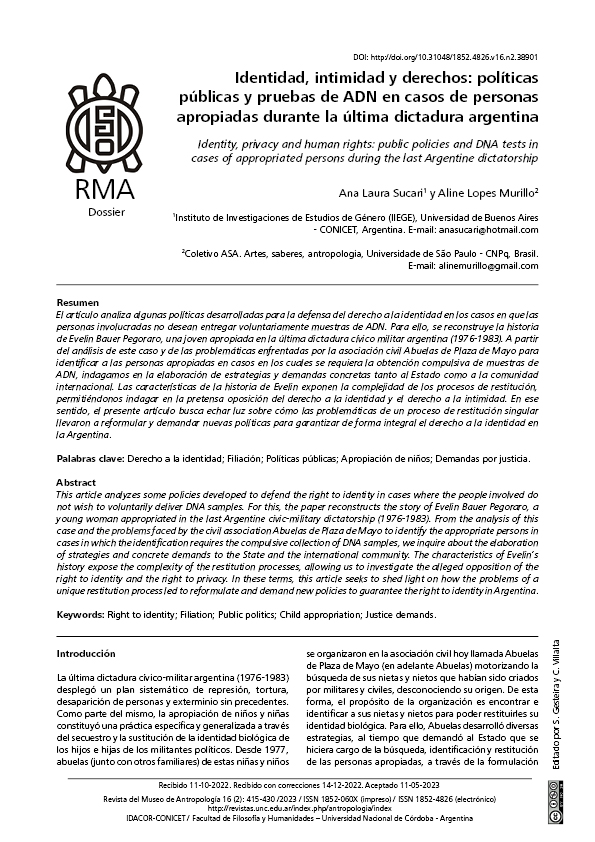“My body registered that the State persecutes me” The development of policies to guarantee the right to identity based on the case of Evelin Bauer Pegoraro
DOI:
https://doi.org/10.31048/1852.4826.v16.n2.38901Keywords:
Right to identity, Filiation, Public politics, Child appropriation, Justice demandsAbstract
This article analyzes some policies developed to defend the right to identity in cases where the people involved do not wish to voluntarily deliver DNA samples. For this, the paper reconstructs the story of Evelin Bauer Pegoraro, a young woman appropriated in the last Argentine civic-military dictatorship (1976-1983). From the analysis of this case and the problems faced by the civil association Abuelas de Plaza de Mayo to identify the appropriate persons in cases in which the identification requires the compulsive collection of DNA samples, we inquire about the elaboration of strategies and concrete demands to the State and the international community. The characteristics of Evelin’s history expose the complexity of the restitution processes, allowing us to investigate the alleged opposition of the right to identity and the right to privacy. In these terms, this article seeks to shed light on how the problems of a unique restitution process led to reformulate and demand new policies to guarantee the right to identity in Argentina.
Downloads
References
Abuelas de Plaza de Mayo. (2007) La historia de las Abuelas. 30 años de búsqueda. Abuelas de Plaza de Mayo.
Abuelas de Plaza de Mayo. (2008) Las Abuelas y la genética: el aporte de la ciencia en la búsqueda de los chicos desaparecidos. Abuelas de Plaza de Mayo.
Ahmed, S. (2004) La política cultural de las emociones. Edinburgh University Press.
Argento, A. (2016) De vuelta a casa. Historias de nietos restituidos. (2a). Marea Editorial.
Catoggio, M. S., & Irrazábal, G. (2020). Genética, derechos humanos y política estatal en la Argentina: Los derroteros legislativos del Banco Nacional de Datos Genéticos y del Registro Nacional de Datos Genéticos vinculados a delitos sexuales (1987-2017). Vía Iuris, 29, 1-51.
Centro de Atención por el Derecho a la Identidad de Abuelas de Plaza de Mayo. (2005). Psicoanálisis. Restitución, Apropiación, Filiación. Abuelas de Plaza de Mayo.
Chaina, P. (2022) La herramienta de Abuelas… Disponible en: <https://www.pagina12.com.ar/484867-la-herramienta-creada-por-abuelas-de-plaza-de-mayo-amplia-su>. Acceso en: 28 de septiembre de 2022.
Comisión Nacional por el Derecho a la Identidad. (2007). El trabajo del Estado en la recuperación de la identidad de jóvenes apropiados en la última dictadura militar.
Domínguez, N. (2007). La serie de las madres. En De donde vienen los niños. Maternidad y escritura en la cultura argentina (pp. 281-348). Beatriz Viterbo Editora.
Gesteira, S. (2016). Entre el activismo y el parentesco. Lo público, lo íntimo, lo político. Las organizaciones sociales de personas que buscan sus orígenes. [Tesis de doctorado en Antropología. Facultad de filosofía y Letras. Universidad de Buenos Aires]. Disponible en: <http://repositorio.filo.uba.ar/handle/filodigital/4597>. Acceso en: 28 de septiembre de 2022.
Laino Sanchis, F. (2020a). De «niños desaparecidos» a «nietos restituidos» Actores, escenarios y discursos en torno a los procesos de búsqueda y restitución de los/as niños/as apropiados/as durante la última dictadura en Argentina (1976-2004). [Tesis de doctorado en Historia, Universidad Nacional de San Martín Instituto de Altos Estudios Sociales. Disponible en: <https://ri.unsam.edu.ar/handle/123456789/1203>. Acceso en: 28 de septiembre de 2022.
Laino Sanchis, F. (2020b). Salir al mundo en tiempos de dictadura: Abuelas de Plaza de Mayo y las redes transnacionales de derechos humanos (1977-1983). Quinto Sol, 24, n°1.
Le Breton, D. (1999). Antropología del dolor. Barcelona, Seix Barral.
Murillo, A. (2023). Pessoas memoriais: práticas de parentesco e política na Argentina. [Tesis de doctorado en Antropología, Universidade de São Paulo e Universidad de Buenos Aires].
Regueiro, S. (2010). Análisis genético para la identificación de niños apropiados: Construcción política y científica de la “naturaleza” y el parentesco. Estudos Feministas, 18(1).
Regueiro, S. (2013). Apropiación de niños, familias y justicia. Argentina (1976-2012). Prohistoria ediciones.
Sarrabayrouse Oliveira, M. J. (2011). Poder judicial y dictadura: El caso de la Morgue Judicial. CELS.
Sucari, A. (2020). Entre el Derecho a la Identidad y la impunidad. La restitución de niñas y niños apropiados en los años ’80 y ’90. Avances del Cesor, 17 (23).
Villalta, C. (2012). Entregas y secuestros. El rol del Estado en la apropiación de niños. Editores del Puerto. CELS.
Villalta, C., & Gesteira, S. (Eds.). (2019). La Convención sobre los Derechos del Niño en la Argentina. Trayectorias, experiencias y activismo.
Villalta, C & Murillo, A. (2020). “YO SOY.: A participação dos nomes e sobrenomes na defesa de direitos”. Abya-Yala: Revista Sobre Acesso à Justiça e Direitos nas Américas. 4 (2):117 a 131.

Downloads
Published
Issue
Section
License
Copyright (c) 2023 Ana Laura Sucari, Aline Lopes Murillo

This work is licensed under a Creative Commons Attribution-NonCommercial-ShareAlike 4.0 International License.
Those authors who have publications with this Journalaccept the following terms:
a. Authors will retain their copyrights and guarantee the journal the right of first publication of their work, which will be simultaneously subject to the Creative Commons Attribution License (Licencia de reconocimiento de Creative Commons) that allows third parties to share the work as long as its author and his first publication in this journal.
b. Authors may adopt other non-exclusive licensing agreements for the distribution of the version of the published work (eg, deposit it in an institutional electronic file or publish it in a monographic volume) provided that the initial publication in this journal is indicated.
c. Authors are allowed and recommended to disseminate their work on the Internet (eg in institutional telematic archives or on their website) before and during the submission process, which can lead to interesting exchanges and increase citations of the published work. (See The Effect of Open Access - El efecto del acceso abierto)











